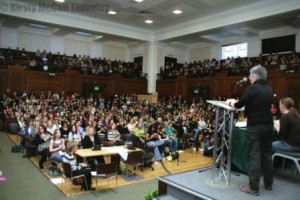Systems of oppression
“Karl Marx was one of the first theorists to explain that ideology is not a free-floating set of ideas, but rather a coherent system of beliefs that are purposely and carefully created by the elite class to promote their interests. Using their ownership of key cultural institutions, the elite then set about distributing these ideas until they become the dominant ways of thinking.” (Huffington Post 2014)
Feminism is not about demonising men – it is about understanding systems of oppression so that we can change them. So what do we mean by a “system of oppression”? A system of oppression is a set of interrelated forces that press down on people who belong to one group (such as women or people of colour) and effect their subordination to another group (such as men or white people).
One of the key characteristics of life as oppressed people experience it is the double bind. This limits the options that are available to a person in such a way that each option exposes the person to penalty, censure, or deprivation. For example, if a young woman is sexually active, she risks being called a “slut” and is considered unworthy of respect. But if she is not sexually active, she is likely to be called “frigid” or “uptight” and to be harassed by men to “loosen up”. If an older woman dyes her hair and wears makeup, she is ridiculed for “trying too hard”, but if she doesn’t, she “has let herself go”. If a woman goes back to work after giving birth, she is plagued by judgement that she is an inadequate, unnatural mother. If she gives up work, she is plagued by suggestions that she “sits around all day doing nothing”, is a gold-digger sponging off her husband (if she has one) or a scrounger on the state (if she doesn’t). And if anything goes wrong, it’s always her fault, no matter who was actually responsible. And so on. On and on.
Continue reading “Feminist Primer” →

 Not even that hot night when I was 19 and slept with the door to my stuffy windowless room open to catch the breeze caused the blinkers to fall from my eyes. The blinkers that blamed my recklessness in leaving the door open and not the man who walked by and saw my smooth body lying there in all its youthful sweetness. He knew he was the only one in the building still awake and so there was a high chance he could get away with it. As indeed he did.
Not even that hot night when I was 19 and slept with the door to my stuffy windowless room open to catch the breeze caused the blinkers to fall from my eyes. The blinkers that blamed my recklessness in leaving the door open and not the man who walked by and saw my smooth body lying there in all its youthful sweetness. He knew he was the only one in the building still awake and so there was a high chance he could get away with it. As indeed he did.
 I am here as the chair of the committee who organised this day to thank all those who have helped to make it happen.
I am here as the chair of the committee who organised this day to thank all those who have helped to make it happen.
